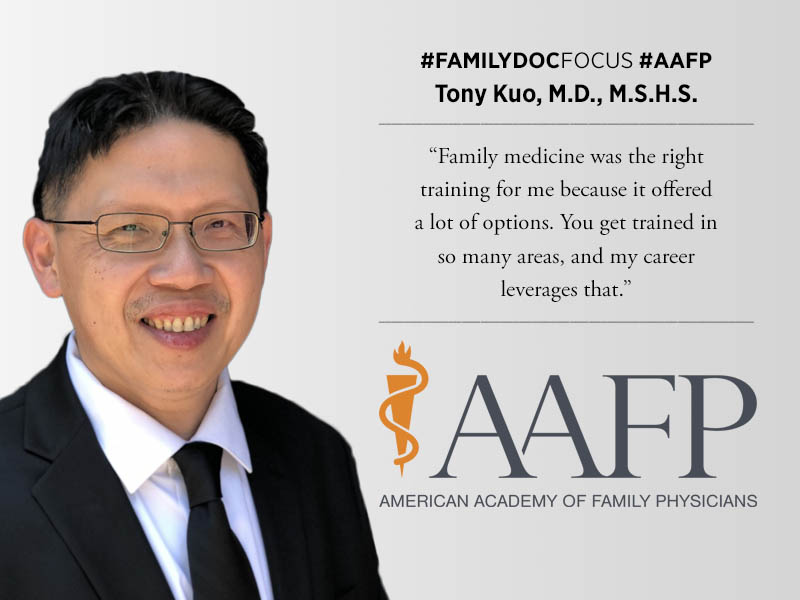Family Medicine Laid Foundation for Public Health Career
June 14, 2021, 2:14 p.m. David Mitchell — Tony Kuo, M.D., M.S.H.S., was drawn to the variety offered by family medicine, and he envisioned himself in a broad-scope practice. But as he saw more and more patients as a resident at the Kaiser Permanente-University of California, Irvine, Family Medicine Residency program, he realized that many people’s health problems are caused or complicated by social and environmental factors.

“In family medicine, you can work in several areas of clinical practice, such as internal medicine, pediatrics, obstetrics, sports medicine,” said Kuo, now director of the Division of Chronic Disease and Injury Prevention for the County of Los Angeles Department of Public Health. “I didn’t realize as I was training that family medicine also lends itself well to preventive medicine, public health and health services.”
After residency, Kuo headed to UCLA for a primary care research fellowship. He also earned his Master of Science in health services there and subsequently stayed on as faculty.
“I gained an appreciation for the need to address policy and systems change,” said Kuo, who remains a health sciences professor in the UCLA David Geffen School of Medicine and an adjunct professor of epidemiology in the UCLA Fielding School of Public Health.
Kuo’s division within the county health department is 90% grant funded. He’s currently involved with 15 active grants, including six as principal investigator.
“For me that’s typical,” said Kuo, whose bibliography lists more than 180 peer-reviewed publications and more than 150 technical and government reports.
Asked to name a favorite among his more than 300 published works, Kuo cited a project that actually was led by one of his UCLA mentees. In 2011, Jessica Jeffrey, M.D., M.P.H., M.B.A. ― now associate medical director of ambulatory services in the UCLA Department of Psychiatry ― published an article regarding how international health electives affect medical student learning and career choice.
That study, published in Family Medicine, found that medical students who participated in international health electives reported being more culturally competent and more likely to choose careers in primary care or public health. Kuo was a co-author on that paper, which has been cited in more than 150 other works.
“I liked that project,” he said. “It talks about exploring opportunities. It comes back to being open-minded, looking at experiences in different places and recognizing that health is not just about clinical care. Maintaining good health, in general, requires understanding many different factors in the social and physical environment.”
Although Kuo found his niche in research and public health, he doesn’t try to steer students and residents to a particular path.
“I try to pass on that they should pursue what they really want to do and like to do,” he said. “It’s important to be mission-driven and have a personal interest in something. The other thing I try to help them with is being open-minded about a career path because there are going to be unexpected opportunities, and you can help people and communities in so many ways. As you move on in your journey, you can integrate new things.”
During the pandemic, Kuo has taken on the role of medical director and science officer for the county health department’s COVID-19 Outbreak Management Branch. That job has included data management, outbreak investigations and ― more recently ― vaccination of homebound residents.
“Family medicine was the right training for me because it offered a lot of options,” he said. “You get trained in so many areas, and my career leverages that.”
Kuo also serves on a number of advisory boards and in other leadership positions, including a role as co-chair of the Board of Directors for the Los Angeles County+University of Southern California Medical Center Foundation and The Wellness Center at the Historic General Hospital. The Wellness Center has connected more than 28,000 people to more than 20 community-based organizations that provide social services, including mental health, legal aid and food assistance.
“It’s a one-stop shop where they can have their social needs met with community resources,” Kuo said.